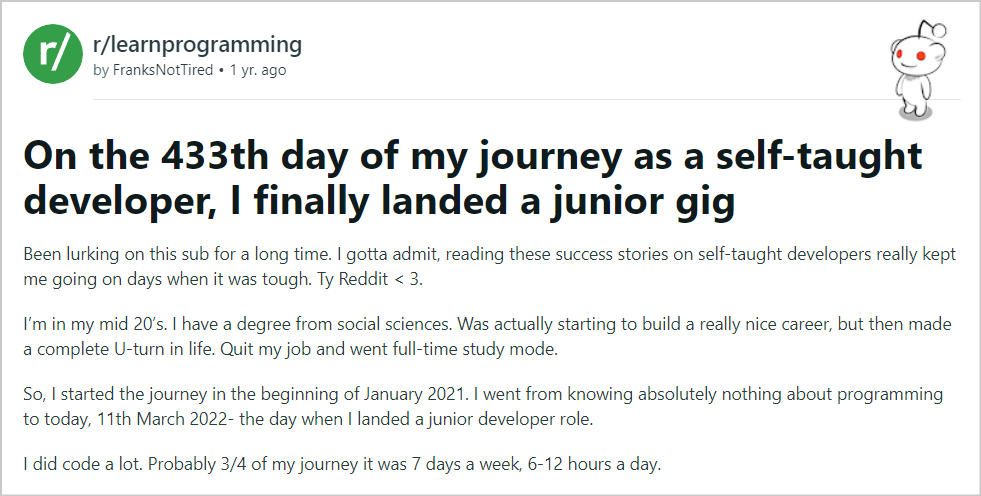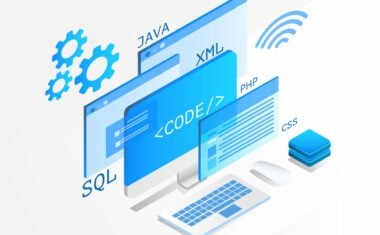When it comes to the world of tech, backend development is like building an engine for a car. You can’t see the results unless you peek under the hood, but you can feel them as soon as you start to drive (or click, in the case of a website or app).
Backend developers are needed for every website or app you use, and so they’re increasingly in high demand. But there’s a steep learning curve to becoming a backend developer, as most backend development jobs require that you know multiple programming languages, in addition to a host of other technical skills.
Looking for some guidance on where to start your backend development journey? Then you’re in the right place. Below, we’ll outline the steps that you can take to launch a career in backend development.
What Does a Backend Developer Do?
A backend developer provides the mechanisms necessary for all the behind-the-scenes processes for websites and software applications. Backend developers write code, develop and manage APIs, test solutions for code-related issues, and provide solutions for system problems. They also contribute to a site’s architectural development.
How To Become a Backend Developer
Follow these eight steps to become a backend developer and build a successful career:
-
Invest in Learning, Training, and Education
-
Become Proficient in a Programming Language
-
Hone Your Skills
-
Build Your Portfolio With Open-Source, Freelance, or Volunteer Projects
-
Your Network Is Your Net Worth
-
Find a Mentor
-
Pursue a Backend Development Internship
-
Polish Your Resume, Prepare, and Start Applying
Invest in Learning, Training, and Education
It can take 1-4 years to meet the educational qualifications that most hiring managers look for. There are several routes you can take, but whichever one you choose, you should start with the foundations.
Foundational Knowledge
For backend developers, core concepts include HTML, CSS, and JavaScript. You also need to know your way around GitHub, and you should be familiar with browser developer tools or browser dev tools, which enable a developer to create and test software and debug software. You also need to know about data structures and algorithms because those form the building blocks of software.
Once you have these basics down, there are three ways that you can further your education:
Formal Education/University Degree
You don’t necessarily require a specific degree for a career in backend development. Some companies look for candidates with a bachelor’s degree in computer science or any IT-related field. But it’s usually not a mandatory requirement.
Bootcamps
You can build a career as a backend developer without a degree too. Bootcamps get you job-ready in 6-12 months and cost a fraction of a traditional university. Some bootcamps, like Springboard’s Software Engineering Bootcamp, also offer a money-back job guarantee if you don’t land a job soon after graduation.
Self-Taught Route
If you’re somewhat on the fence about a career in backend development and aren’t sure that you can or want to commit to a bootcamp or university degree, the self-taught route can be a great way to go. Here’s how to make that happen:
Online Courses
These online courses are a great way to test the waters of backend development:
You can also check out FreeCodeCamp’s videos for tutorials on popular programming languages and software development.
Dedicated Coding Websites
Coding websites have all the documentation you need to understand a programming project or database framework, and can be a great way to teach yourself the fundamentals of backend development. Check out the following sites:
Blogs
For easy-to-digest text resources, give these blogs a read:
- Increment’s issues on APIs, software engineering, and cloud tech
- Uber’s engineering blog, which covers the many moving pieces that constitute Uber’s tech offerings and workflows
- Martin Kleppmann’s blog, where he does book reviews, conference coverage, and detailed pieces on tech.
Books
If you are an old-school learner, here are some book recommendations:
- Designing Data-Intensive Applications by Martin Kleppmann
- Computer Networking: A Top-Down Approach by James Kurose and Keith Ross
- Computer Networks; A Systems Approach by Larry Peterson and Bruce Davie
Become Proficient in a Programming Language
Backend development usually requires some combination of the following programming languages:
Python
This is the most common programming language used by backend developers, and it’s a widely applicable language. Check out some online Python courses, and once you have the basics down, start building your own projects.
PHP
PHP is another programming language considered to be essential for backend development. W3’s PHP tutorials are a great way to learn the language, as is this 6.5-hour course by Traversy Media.
Related Read: How To Become a PHP Developer
JavaScript
Javascript has evolved over the years, so if you want to learn it, make sure that the resources you’re using are up to date. The Modern JavaScript Tutorial is excellent for this.
SQL
Springboard’s SQL guide is a great place to start if you’re looking to learn SQL for backend development. Other resources include Udemy’s MySQL bootcamp taught by Colt Steele, a well-renowned developer and tutor. Want a YouTube tutorial? Try Mosh Hamedani’s 3-hour MySQL course.
Others
Besides those four core programming languages, some companies will expect you to know other programming languages like Kotlin, C#, and TypeScript. You can find YouTube tutorials for all of these.
Hone Your Skills

As a backend developer, you’ll need the following combination of soft and technical skills:
Technical Skills
These technical skills are instrumental to your backend development career:
- Basic understanding of modern CI/CD (Continuous integration, continuous delivery, and deployment) methodologies. This allows for the efficient delivery of software to the customer through automated testing and quick debugging.
- A knowledge of REST (Representational State Transfer Architectural architectural site) API. Backend developers can create applications with different programming languages with reusable code. With REST API, they can transfer data across applications.
- Proficiency with modern data web frameworks such as Spring Boot, Quarkus, and Micronaut.
Soft Skills
These soft skills are key too:
- Communication. Everything you do will support the frontend team’s vision, so it’s essential to communicate with them clearly. Many backend development jobs are now remote, so communicating effectively over emails and during online code reviews has become even more vital.
- Problem-solving. A significant part of a backend developer’s job is to put out fires and give creative solutions, especially during deployment. This requires quick problem-solving and flexibility, so the project doesn’t go off the rails.
Build Your Portfolio With Open-Source, Freelance, or Volunteer Projects
Backend engineers and developers need portfolios to prove their expertise. If you’re just starting out, you can build a portfolio by volunteering for not-for-profits and local businesses. You can also collaborate with other programmers on GitHub for open-source projects, and consider giving coding challenges a shot.
Your Network Is Your Net Worth
A solid network is one of the few surefire ways to land a job. Here are some ways to build yours:
- LinkedIn. Search for backend tech leaders who share tips and resources on the platform and have a commendable online presence. Engage with their posts to build valuable relationships.
- Online Communities. Reddit, Slack, and GitHub are great for advice and encouragement when you hit roadblocks. Build connections by both asking for and giving help.
- Conferences and Meetups. Want to find who to connect with in a more structured manner? Attend conferences and meetups in your area. Initiate communication with the panelists and speakers you enjoyed listening to.
Find a Mentor
A programming mentor is an invaluable resource. Stay in touch with more senior programmers you meet on your journey and develop a relationship.
Pursue a Backend Development Internship
Internships are a great way to get a sense of the day-to-day life of a programming developer. It’s also a great way to make invaluable connections.
Polish Your Resume, Prepare, and Start Applying
Once you have a portfolio that you’re ready to share, it’s time to start applying for backend jobs. Build a master resume outlining everything you have learned, but make sure that you also tailor your resume to each job that you apply for. Recruiters will be able to tell the difference.
Becoming a Backend Developer: Where To Start
Where to start your journey is entirely dependent upon where you are now. Here are some common starting points:
No Experience
If you don’t have any experience in programming or development, start with the basics that we outlined above. At first, you should focus on gaining knowledge, not network building or job searches. That’ll all come later.
Related Career Transition
Perhaps you’re transitioning from frontend to backend development, or you’re currently working as an information architect or Python developer. If that’s the case, and you already have some knowledge of the field, then you have a solid foundation that you can rely upon. The self-taught route is much easier if this is the case for you, but bootcamps are still a great option.
Unrelated Career Transition
If you’re transitioning from an unrelated career, consider the value of the soft skills you’ve picked up along the way. Then, pick one of the paths that we outlined above, depending on what suits your needs.
Going Freelance
Starting out as a freelancer without prior work experience can be a bumpy road. But it’ll only get easier over time, as you gain clients and build your portfolio.
Get To Know Other Software Engineering Students
Geraldo Gomes
Software Engineer at Affirm
Nadia Luna
Student at Springboard Software Engineering Bootcamp
Dave McConeghy
Software Engineering Career Track Student at Springboard
Becoming a Backend Developer: Real-Life Examples To Learn From
Needing inspiration? Check out these stories of real-life backend developers:
Tiffany Janzen
Janzen, a Developer Advocate for Stackbit in Toronto, advocates for a three-forked approach to becoming a backend developer:
- Learn 1-2 backend programming languages
- Get familiar with git, a DevOps tool for coordinating projects
- Master a database
She suggests picking a tutorial or course that fits your learning style for all three steps. Her final tip is not to try to learn everything before applying for jobs in backend web development. As a backend developer, your learning never stops, so continue to learn and upskill while you’re on the job.
FranksNotTired

This Redditor outlined their 433-day journey to becoming a self-taught backend developer. With a degree in social sciences and no prior developer knowledge, their first step was to immerse themselves in tutorials. They learned Java through a free course, then moved on to HTML and CSS, for which they relied on YouTube tutorials.
FranksNotTired advises anyone going down the self-taught route to avoid getting stuck in a rabbit hole of tutorials. Instead, discover courses by looking up specific problems and issues that you face while working on projects.
How Much Can You Earn as a Backend Developer?
Backend developer salaries vary greatly, depending on years of experience, certifications, and skills.
Entry-Level Backend Developer

Entry-level backend developers make an average of $77,467 a year.
Mid-Level Backend Developer

The average salary for a mid-level backend developer is around $90,000.
Senior Backend Developer

The average salary for a senior backend developer is over six figures, and can go as high as $140-175K.
How To Become a Backend Developer FAQs
We’ve got the answers to your most frequently asked questions:
Can You Become a Backend Developer Without a Degree?
Yes, you can become a backend developer without a degree. It helps if you have done some backend developer courses before diving into the job search.
Are Backend Developers Paid Well?
Yes! Making six figures is definitely attainable with the right skill set.
Is It Harder To Learn Backend or Frontend Development?
Neither is harder than the other, but depending on your skill set and natural aptitude, one might be more intuitive. For a career in front-end development, you’ll need to grasp the basics of design. For backend development, you’ll need to be proficient in multiple programming languages.
What Programming Languages Should a Backend Developer Know?
Python and PHP are the two most essential languages, but TypeScript, Java, and C++ are popular as well.
Since you’re here…
Interested in a career in software engineering? Join our mentor-led Software Engineering Bootcamp or our foundational Software Engineering Course if you’re just starting out. We help people make the switch every day (just peep our reviews). You can do it, too!









